| Srl | Item |
| 1 |
ID:
059959
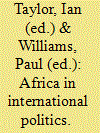

|
|
|
|
|
| Publication |
London, Routledge, 2004.
|
| Description |
xii, 225p.
|
| Series |
Routledge advances in International relations and global politics; no. 27
|
| Standard Number |
0415318580
|
|
|
|
|
|
|
|
|
|
|
|
Copies: C:1/I:0,R:0,Q:0
Circulation
| Accession# | Call# | Current Location | Status | Policy | Location |
| 049318 | 327.6/TAY 049318 | Main | On Shelf | General | |
|
|
|
|
| 2 |
ID:
051889
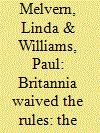

|
|
|
|
|
| Publication |
Jan 2004.
|
| Summary/Abstract |
Ten years after the 1994 Rwandan genocide occurred, serious questions remain about the circumstances of the British government's response. This article critically evaluates the response of John Major's government to the genocide. It does so in four stages. The first section provides a brief overview of the Major government's international agenda in 1994, focusing on British policy towards the war in Bosnia and the African continent in general. The second section deals with the substance of Britain's Rwanda policy, while the third discusses the ways in which this policy has been almost totally omitted from mainstream accounts of this period. The final section provides a critical evaluation of some of the tactics that British officials employed to avert criticism of their government's policies. Based on the evidence presented we conclude that the British government displayed a deeply troubling indifference towards the victims of Rwanda's genocide.
|
|
|
|
|
|
|
|
|
|
|
|
|
|
|
|
| 3 |
ID:
052316
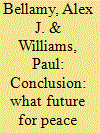

|
|
|
|
|
| Publication |
Spring 2004.
|
| Summary/Abstract |
This concluding essay discusses two contrasting agendas for future peace operations: the 'Brahimi agenda', the main elements of which resemble a problem-solving approach, and a 'critical agenda'. These agendas have different priorities but both contain important insights about how peace operations might be conducted more effectively. The essay begins by reflecting on the Brahimi agenda and suggests that some of its fundamental political insights have been sidelined during the implementation process. It then discusses one of the central challenges confronting peace operations, namely, how to deal with so-called 'spoilers'. We argue that while proposals for more privatized and regionalized peace operations may offer short-term palliatives in extreme circumstances, they suffer from several important limitations. The second section outlines how a critical agenda might contribute to making peace operations more effective in the short-term and making them redundant in the longer-term.
|
|
|
|
|
|
|
|
|
|
|
|
|
|
|
|
| 4 |
ID:
020755


|
|
|
|
|
| Publication |
2001.
|
| Description |
140-168
|
|
|
|
|
|
|
|
|
|
|
|
|
|
|
|
| 5 |
ID:
052307
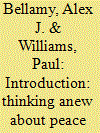

|
|
|
| 6 |
ID:
052312
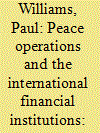

|
|
|
|
|
| Publication |
Spring 2004.
|
| Summary/Abstract |
This essay reflects critically upon the question of why peace operations become necessary in certain parts of the world. It does so by exploring why the policies of the International Financial Institutions (IFIs) should be understood as part of the explanation for war and genocide in Rwanda (1990-94) and war in Sierra Leone (1991-2002), which, in turn, eventually necessitated the presence of UN peace operations in these two states. The first section summarizes IFI engagement with the issue of violent conflict. This is followed by a critical evaluation of the ways in which in Rwanda and Sierra Leone, IFI policies helped fan the flames of war and genocide which UN (and other) peacekeepers were subsequently asked to put out. The final part reflects upon the relationship between IFI policies and peace operations in Rwanda and Sierra Leone. The essay concludes that the current regulation of the global capitalist economy and the philosophy underpinning IFI policies have fuelled patrimonial and authoritarian systems of governance in Rwanda and Sierra Leone. This has had disastrous consequences for both the citizens of these states and UN peace operations.
|
|
|
|
|
|
|
|
|
|
|
|
|
|
|
|
| 7 |
ID:
057634


|
|
|